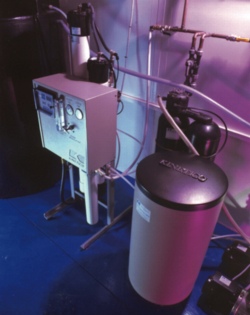Hard facts on soft water

John Bissett looks at how water-softening systems can increase the energy efficiency and longevity of heating and hot-water services in commercial buildings.
The building services sector is under intense pressure to help deliver buildings that use less energy and have lower carbon emissions.
Government legislation and incentives are driving through changes in building practices and technologies to ensure that the UK meets its 34% emissions cut on 1990 levels by 2020, which is required under the Kyoto Agreement.
Targets for all new buildings to become carbon neutral represent an important stepping stone on this path. New schools face a 2016 deadline, public sector non-dwellings are required to become zero carbon by 2018, and other non-dwellings, such as hotels, will need to comply by 2019.
With energy costs rising, it is clear, too, that financial pressures are playing a part in greening our building stock. It is self evident that if we as an industry can develop solutions that use fuel more efficiently, then the owners and occupiers of buildings will be helped to reduce their costs.
However, one of the key challenges facing consultants and contractors is that whilst the building services themselves may be designed and installed with impeccable low- or zero-carbon credentials, what happens when the building has been occupied for some time?
One of the major enemies in maintaining fuel efficiency is the formation of scale within the water services of a building. Small amounts of scale can form within weeks on heating and hot water equipment, and just 1.6 mm of scale can lead to a 12% loss in heating efficiency.
As a result, building-services equipment which was specified for its energy efficiency at the design stage can be quickly compromised in its performance. This is an especially common problem in the hard-water areas of the UK, including London and the south east of England.
In these parts of the country, magnesium and calcium salts can quickly build up as scale and inhibit the heating efficiency of equipment such as commercial boilers, DHW cylinders etc. Scale accumulates on the heat-exchange surfaces and dramatically reduces the heat-transfer efficiency of the equipment. Over time, scale will also build up within the pipework itself, reducing its water-carrying capacity. These deposits also promote corrosion within boilers, calorifiers and pipework.
With fuel efficiency and carbon reduction top of the agenda, building-services consultants and contractors should consider the positive contribution effective water-treatment technology can make. Without water treatment, problems can quickly escalate — resulting not just in poor performance but in component breakdown and needlessly expensive maintenance.
It is not just performance and energy efficiency that can be affected. There are serious environmental risks surrounding scale build-up, including the potential for legionella growth.
Scale creates the ideal environment for the bacteria to thrive. Dripping taps can deposit scale in and around the tap, which with high ambient room temperatures provides an ideal growth medium for legionella. In hot systems, scale creates an excellent breeding ground for trapped legionella and is not easily penetrated by disinfectants. Scale deposits that have been colonised by legionella can continuously recontaminate a system, even after disinfection.

Since the introduction of ACoP L8 (Approved Code of Practice & Guidance L8, ‘Legionnaires’ Disease — the control of legionella bacteria in water systems’) organisations are obliged to take sufficient precautions to eliminate the build-up of legionella bacteria.
Descaling a hot-water system is time consuming and expensive. In contrast, if low-energy water-softening technology is specified at the new-build stage or retrofitted where problems have occurred it can help ensure HVAC systems perform to their design efficiency and minimise risks associated with legionella.
Non-electric, automatic treatment systems, such as Kinetico’s patented systems, are an ideal choice as they suit a wide range of applications and are powered by the kinetic force of moving water, minimising energy consumption still further.
They work by removing the calcium and magnesium ions through an ion-exchange process. The twin-tank design can continuously provide softened water by having one tank operational while the other is being cleaned with a salt solution to remove calcium and magnesium ions.
Most water softeners have timers so regeneration can take place at a set time when the water is not being used —at night, for example. This approach can prove counter-productive, especially if only a little water has been used during the day. The best option is to measure the use of soft water and only regenerate on demand to avoid unnecessary waste.
Another benefit of a Kinetico water-softening system is that they are powered by the kinetic energy of the water, so no electricity is needed, and the cost and labour associated with an electricity supply are eliminated.
As water requirements for buildings vary, water-softening systems should be made to fit the needs of a project. Being specified for each building’s particular needs and services requirements ensures that the final system is more reliable and easier to install — again making it a whole lot easier for the contractor.
Water softening is an important area of building services, but one that demands a higher profile because of the impact it has on the performance of the overall system. It delivers improved energy efficiency, reduced maintenance costs and healthier water services for building occupants.
John Bissett is operations director with Kinetico.







